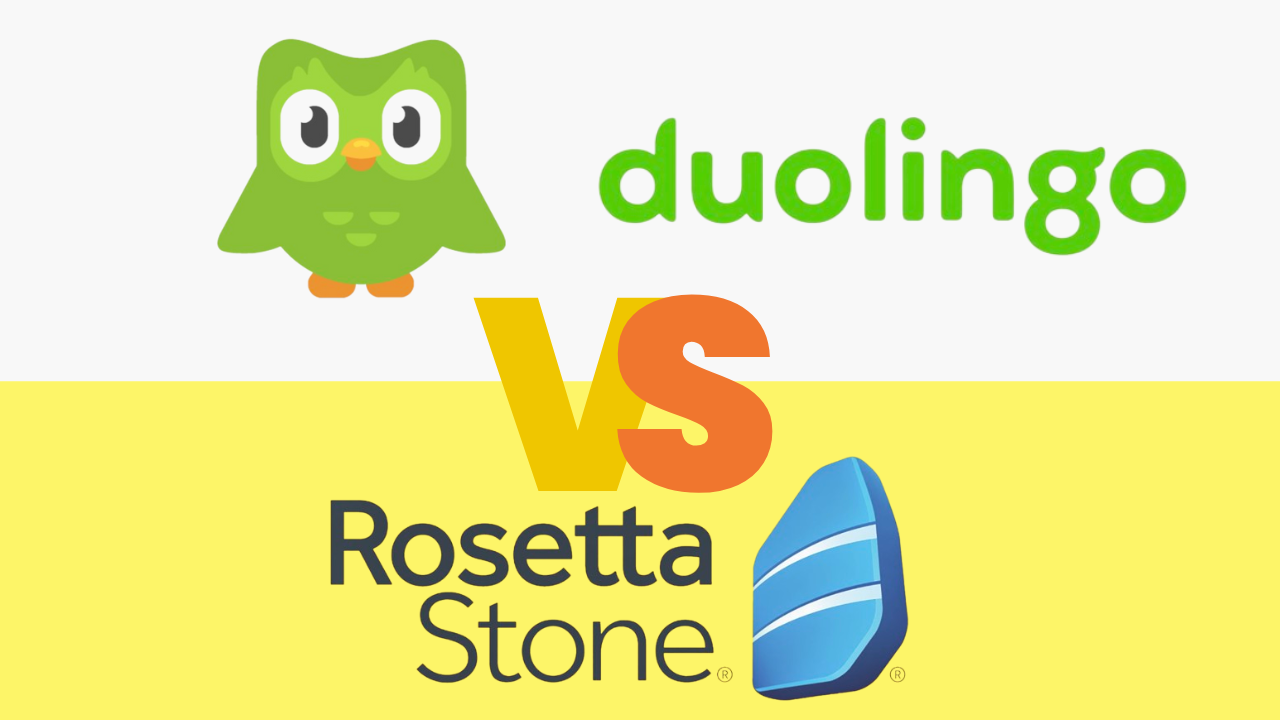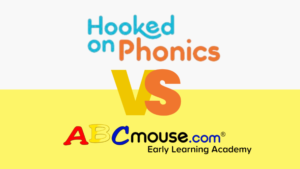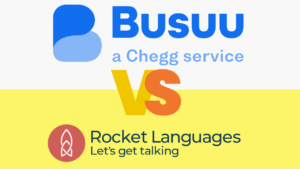Learning a new language has become increasingly important in our interconnected world, opening up opportunities for travel, career advancement, and cultural understanding. As technology has advanced, language learning apps have become a popular way for people to learn a new language at their own pace and convenience.
In this comprehensive guide, we will compare two of the most popular language learning apps, Duolingo and Rosetta Stone, to help you decide which one is the best fit for your language learning journey.
Key Takeaways:
- Duolingo and Rosetta Stone are two leading language learning apps that offer different approaches to language acquisition.
- Factors to consider when choosing the right language app include language selection, user interface, pricing, speech recognition, course structure, progress tracking, offline access, customer support, mobile and desktop compatibility, learning pace, and user reviews.
- Duolingo is known for its gamified approach and is free to use, while Rosetta Stone offers a more immersive and comprehensive learning experience at a cost.
- Both apps have their strengths and weaknesses, and the best choice depends on individual preferences and learning goals.
- It’s important to consider personal motivation, commitment, and consistent practice as crucial elements of successful language learning, regardless of the app you choose.
Methodology
Before we dive into the comparison, it’s important to understand the methodology used to evaluate Duolingo and Rosetta Stone. We have thoroughly researched and tested both apps, considering factors such as language selection, user interface, pricing, speech recognition, course structure, progress tracking, offline access, customer support, mobile and desktop compatibility, learning pace, user reviews, and overall effectiveness.
To ensure a comprehensive evaluation, we followed a systematic approach that involved multiple steps:
- Conducting extensive research on the features and functionalities offered by both apps.
- Using both apps for an extended period, covering a range of language courses and exercises.
- Assessing the user experience, including the ease of navigation and overall design.
- Evaluating the accuracy and effectiveness of speech recognition technology in providing feedback on pronunciation and speaking exercises.
- Examining the course structures, progress tracking features, and availability of offline access.
- Considering the level of customer support provided by each app.
- Analyzing the compatibility of the apps with mobile and desktop devices.
- Exploring the different learning pace options offered by each app.
- Reviewing user feedback and testimonials to gain insights into the experiences of language learners.
By employing this rigorous methodology, we aim to provide you with an objective and comprehensive comparison of Duolingo and Rosetta Stone, allowing you to make an informed decision when choosing a language learning app.
Language Selection
One of the key factors to consider when choosing a language learning app is the range of languages it offers. In this section, we will compare the language selection options available in two popular language learning apps, Duolingo and Rosetta Stone. We will assess both the variety and depth of languages offered, as well as any differences in the quality of instruction for each language.
Both Duolingo and Rosetta Stone provide a wide selection of languages for users to choose from, catering to a diverse range of language learners. While Duolingo offers over 35 languages, including popular choices such as Spanish, French, German, and Japanese, Rosetta Stone boasts an impressive catalog of 24 languages, covering major languages like English, Spanish, French, Russian, and many more.
However, it’s important to note that the depth of instruction may vary across both platforms. While Duolingo offers comprehensive language courses for popular languages, it may have a more limited selection of lessons and resources for less commonly spoken languages. On the other hand, Rosetta Stone is known for its immersive and in-depth approach to language learning, providing users with a more extensive curriculum for each language offered.
Ultimately, the best language learning app for you will depend on the language(s) you are interested in learning. If you’re looking for a wide range of language options with a focus on popular languages, Duolingo may be a suitable choice. However, if you’re interested in a more immersive and comprehensive learning experience, especially for less commonly spoken languages, Rosetta Stone may be the better option for you.
User Interface
The user interface of a language learning app is a key factor in determining the overall user experience. A well-designed and intuitive interface can greatly enhance the learning process, making it more engaging and enjoyable. In this section, we will compare the user interfaces of Duolingo and Rosetta Stone, analyzing their ease of use, navigation, and overall design.
Duolingo boasts a clean and visually appealing interface. The app adopts a friendly and colorful design, creating a welcoming learning environment. The navigation is straightforward, with clear icons and menu options that guide users through the different exercises and lessons. The layout is neat, ensuring that users can easily find their way around the app.
Rosetta Stone’s user interface embraces a more minimalist approach. The interface prioritizes the learning content, with simple and uncluttered screens. The navigation is seamless, allowing users to progress through the lessons smoothly. The design is sleek and modern, reflecting the app’s commitment to providing an immersive language learning experience.
Both Duolingo and Rosetta Stone offer a user-friendly experience, but there are some notable differences. Duolingo’s interface is vibrant and playful, appealing to a wider audience, including younger learners. On the other hand, Rosetta Stone’s interface exudes elegance and professionalism, catering to a more mature demographic.
When it comes to usability, both apps excel in providing clear instructions and intuitive controls. Duolingo’s interface encourages users to engage with gamified elements, such as earning virtual currency and completing streaks, which can be motivating for language learners. Rosetta Stone, on the other hand, focuses on creating a immersive learning environment, where users can fully immerse themselves in the target language.
In terms of design, both apps present a visually pleasing experience, but it ultimately comes down to personal preference. Some users may gravitate towards Duolingo’s playful and interactive design, while others may prefer Rosetta Stone’s sleek and sophisticated aesthetic.
To summarize, when comparing the user interfaces of Duolingo and Rosetta Stone, it becomes evident that both apps offer a user-friendly experience with distinct design approaches. The choice between the two will largely depend on individual preferences and the desired learning environment.
| Aspect | Duolingo | Rosetta Stone |
|---|---|---|
| Design | Vibrant and playful | Sleek and sophisticated |
| Navigation | Straightforward with clear icons | Seamless and uncluttered |
| Target Audience | Wide range, including younger learners | Mature demographic |
| Motivational Features | Gamified elements, virtual currency, and streaks | Immersive learning environment |
Pricing
When considering a language learning app, one of the most important factors to evaluate is the pricing structure. In this section, we will compare the pricing options offered by Duolingo and Rosetta Stone, helping you determine which app provides the best value for your money.
Duolingo Pricing
Duolingo offers users free access to its language learning platform, making it an attractive option for budget-conscious learners. However, they also provide a premium subscription called Duolingo Plus, which removes ads, offers offline access, and provides additional features. The Duolingo Plus subscription costs $9.99 per month or $79.99 per year.
Rosetta Stone Pricing
Rosetta Stone takes a different pricing approach, offering users different subscription plans based on the duration of their commitment. They have a 3-month plan for $35.97, a 12-month plan for $95.88, and a lifetime plan for $199. While the lifetime plan may seem more expensive upfront, it provides access to all languages offered by Rosetta Stone and can be a cost-effective option in the long run.
It’s worth noting that both Duolingo and Rosetta Stone occasionally run promotions, discounts, and bundle deals, so it’s always a good idea to check for any ongoing offers before making a decision.
Now, let’s compare the pricing structures of Duolingo and Rosetta Stone in a side-by-side table to help you visualize the differences:
| App | Free Access | Premium Subscription | Premium Subscription Price |
|---|---|---|---|
| Duolingo | â | Duolingo Plus | $9.99/month $79.99/year |
| Rosetta Stone | N/A | Subscription Plans | $35.97/3 months $95.88/12 months $199/lifetime |
Speech Recognition
Speech recognition technology is a key feature that language learners often seek in an app. It allows users to practice their pronunciation and receive immediate feedback, helping them improve their speaking skills. In this section, we will evaluate the speech recognition capabilities of two popular language learning apps: Duolingo and Rosetta Stone.
Both Duolingo and Rosetta Stone utilize speech recognition to provide learners with an interactive and immersive language learning experience. They analyze users’ pronunciation and compare it to native speaker models, providing feedback on accuracy and fluency.
Quote from User:
“The speech recognition feature on Duolingo helped me gain confidence in speaking Spanish. It accurately identified my pronunciation errors and gave me suggestions for improvement.”
While both apps offer speech recognition, there may be differences in terms of accuracy and effectiveness. The speech recognition technology in Duolingo has been praised for its responsiveness and reliability. It enables learners to practice speaking in real-time, making the app engaging and interactive.
On the other hand, Rosetta Stone’s speech recognition technology also performs well, providing valuable feedback to learners. It allows users to repeat phrases and compare their pronunciation to a native speaker’s, helping them refine their skills through continuous practice.
Quote from User:
“I found the speech recognition in Rosetta Stone to be very helpful in improving my pronunciation. It was able to detect subtle nuances and provided accurate feedback.”
| Language Learning App | Speech Recognition Capabilities |
|---|---|
| Duolingo | Responsive and reliable, providing real-time feedback on pronunciation |
| Rosetta Stone | Accurate and helpful, allowing users to compare their pronunciation to native speakers’ |
The table above summarizes the speech recognition capabilities of Duolingo and Rosetta Stone. Both apps offer effective tools to enhance learners’ pronunciation skills, but their approaches may differ slightly. Ultimately, the choice between the two will depend on individual preferences and learning goals.
Now that we have evaluated the speech recognition features of Duolingo and Rosetta Stone, let’s move on to comparing their course structures, progress tracking, and offline access in the next section.
Course Structure, Progress Tracking, and Offline Access
In the realm of language learning apps, the structure of language courses, the ability to easily track progress, and the convenience of offline access are pivotal considerations for learners. Comparing Duolingo and Rosetta Stone, we will analyze their course structures, progress tracking features, and offline access availability to assist you in selecting the optimal app that aligns with your preferred learning style and lifestyle.
Duolingo's Course Structure
Duolingo offers a comprehensive course structure, divided into skill levels and lessons, allowing learners to progress systematically. Each lesson focuses on vocabulary, grammar, and contextual usage through interactive exercises, such as matching, multiple-choice quizzes, and translation tasks. Duolingo’s bite-sized lessons cater to learners who prefer shorter, regular study sessions.
Rosetta Stone's Course Structure
Rosetta Stone presents a structured curriculum centered around immersion and contextually relevant conversations. Through its Dynamic Immersion® method, learners engage in audio, visual, and text-based activities along the learning journey. The lessons include speech recognition exercises to improve pronunciation skills while developing vocabulary, grammar, and sentence formation.
Progress Tracking Features
Both Duolingo and Rosetta Stone offer progress tracking features to help learners measure their achievements and stay motivated. Duolingo allows users to earn XP (Experience Points) for completing lessons, leveling up, and maintaining consistent study streaks. Additionally, Duolingo provides a clear visual representation of progress across various language skills.
Rosetta Stone, on the other hand, employs a progress tracking system that monitors completed activities and the overall percentage of the course completed. This enables learners to track their advancement and revisit previous lessons if necessary.
Offline Access Availability
Offline access to language learning materials can be advantageous, particularly for travelers or learners without consistent internet access. Duolingo provides offline access to some features and downloadable lessons for select languages, allowing users to continue practicing without an internet connection.
Rosetta Stone’s mobile apps also offer offline features for some languages, enabling learners to review lessons and practice vocabulary while on the go, even when internet access is limited or nonexistent.
| Features | Duolingo | Rosetta Stone |
|---|---|---|
| Course Structure | Divided into skill levels and lessons; bite-sized lessons | Structured curriculum with immersion and contextually relevant conversations |
| Progress Tracking | XP system, visual representation of progress | Monitoring completed activities and course completion percentage |
| Offline Access | Available for select features and downloadable lessons | Offline features for some languages |
Customer Support, Mobile and Desktop Compatibility, Learning Pace, and User Reviews
When choosing a language learning app, it’s important to consider factors beyond just the core features. Customer support, mobile and desktop compatibility, learning pace, and user reviews can greatly impact your overall experience. Let’s take a closer look at how Duolingo and Rosetta Stone compare in these areas.
Firstly, customer support is essential for addressing any questions or concerns that may arise during your language learning journey. Duolingo provides a detailed FAQ section on their website and offers a community forum where users can ask and answer questions. On the other hand, Rosetta Stone offers 24/7 live chat support and email support, ensuring prompt assistance for any issues you may encounter.
Next, mobile and desktop compatibility is crucial for seamless learning across different devices. Both Duolingo and Rosetta Stone offer mobile apps for iOS and Android, allowing you to learn on-the-go. Additionally, they both have desktop versions that provide a more comprehensive learning experience. Whether you prefer learning on your smartphone, tablet, or computer, both apps have you covered.
Learning pace is another aspect to consider, as everyone learns at their own speed. Duolingo offers a gamified approach with bite-sized lessons, allowing you to learn at your own pace and progress through levels. On the other hand, Rosetta Stone offers a more structured approach with comprehensive lessons that build upon each other. It’s important to determine which learning pace aligns better with your preferences and goals.
User reviews can provide valuable insights into the overall user experience with an app. Duolingo has garnered a large and passionate user base, with millions of positive reviews praising its effectiveness and accessibility. Rosetta Stone, known for its immersive language learning approach, also has a strong user base and favorable reviews. Taking into account user reviews can help you gauge the satisfaction level of learners and make an informed decision.
FAQ
Q: How do I choose between Duolingo and Rosetta Stone?
A: Choosing between Duolingo and Rosetta Stone depends on your individual needs and preferences. Duolingo is a popular and free app that offers gamified language learning with a wide variety of languages to choose from. Rosetta Stone, on the other hand, is a paid app that focuses on immersive learning and offers a more structured approach. Consider factors such as your learning goals, preferred learning style, available budget, and the languages you want to learn when making your decision.
Q: Can I learn multiple languages on both Duolingo and Rosetta Stone?
A: Yes, both Duolingo and Rosetta Stone offer the opportunity to learn multiple languages. Duolingo provides a wide range of languages to choose from, and you can learn as many as you desire simultaneously. Rosetta Stone also offers multiple languages, but you typically need to purchase separate subscriptions for each language. Consider your language learning goals and the level of commitment you are willing to invest in learning multiple languages when deciding which app to use.
Q: Are Duolingo and Rosetta Stone suitable for beginners?
A: Yes, both Duolingo and Rosetta Stone are suitable for beginners. Duolingo offers a beginner-friendly approach with its gamified lessons, while Rosetta Stone provides a robust learning structure that is beneficial for beginners. Both apps are designed to accommodate learners with no prior knowledge of the language and gradually build their skills. However, the teaching methods and interface differ, so it’s a good idea to try out both and see which one aligns better with your learning style.
Q: Do Duolingo and Rosetta Stone offer speaking exercises?
A: Yes, Duolingo and Rosetta Stone both offer speaking exercises to improve your pronunciation and conversational skills. Duolingo incorporates speech recognition technology that grades your pronunciation and provides instant feedback. Rosetta Stone also focuses on developing your speaking abilities through interactive exercises and speech recognition features. Engaging in speaking exercises regularly can significantly enhance your language learning experience.
Q: Can I use Duolingo and Rosetta Stone offline?
A: Yes, both Duolingo and Rosetta Stone offer offline access to some extent. Duolingo allows you to download lessons and practice them offline, which is particularly helpful when you don’t have a reliable internet connection. Rosetta Stone also offers offline access to its lessons through its mobile app, enabling you to learn on the go. However, it is important to note that certain features, such as progress syncing, may require an internet connection.
Q: Do Duolingo and Rosetta Stone provide customer support?
A: Yes, both Duolingo and Rosetta Stone provide customer support to assist users with any questions or issues they may encounter. Duolingo offers a Help Center with frequently asked questions and a discussion forum where you can seek help from the community. Rosetta Stone provides customer support through email, live chat, and phone, ensuring prompt assistance for its users. If you require personalized support or have specific concerns, Rosetta Stone may be a better option for you.
Q: Are Duolingo and Rosetta Stone compatible with mobile and desktop devices?
A: Yes, both Duolingo and Rosetta Stone are compatible with mobile and desktop devices. Duolingo has native apps available for iOS and Android devices, as well as a web version accessible through any browser. Rosetta Stone offers mobile apps for iOS and Android, as well as a desktop application compatible with both Windows and Mac. This flexibility allows you to learn on your preferred device, whether it’s a smartphone, tablet, or computer.
Q: How much do Duolingo and Rosetta Stone cost?
A: Duolingo offers a free version of its app with ads. They also provide a premium subscription called Duolingo Plus, which removes ads, provides offline access, and offers additional features for $6.99 per month. Rosetta Stone offers multiple subscription plans, with prices varying based on the language and duration of the subscription. They often have promotional offers and discounts available, so it’s worth checking their website for the most up-to-date pricing information.
Q: Are there any alternatives to Duolingo and Rosetta Stone?
A: Yes, there are several alternatives to Duolingo and Rosetta Stone in the world of language learning apps. Some popular alternatives include Babbel, Memrise, and Pimsleur. These apps offer their unique features and teaching methods, so it’s worth exploring them to find the one that best suits your learning preferences and goals. Additionally, you can also consider traditional language learning methods, such as attending classes or hiring a tutor.






Pingback: Pimsleur vs Busuu 2024 Showdown: Discover the Ultimate Shortcut to Language Mastery - Language Learning Apps Reviews
Pingback: RocketLanguages vs Busuu 2024: Which is the Better Platform for Language Mastery? - Language Learning Apps Reviews